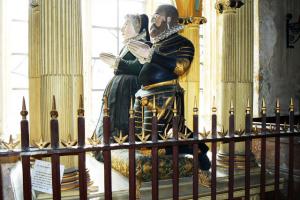Go To Section
ST. JOHN, Nicholas (by 1526-89), of Lydiard Tregoz, Wilts.
Available from Boydell and Brewer
Family and Education
b. by 1526, 1st s. of John St. John by 1st w., and half-bro. of William St. John. m. c.1548, Elizabeth, da. of Sir Richard Blount of Mapledurham, Oxon., 3s. inc. Oliver† 2da. suc. fa. 5 Apr. 1576.2
Offices Held
Gent. pens. by 1552-60 or later; porter, Wallingford castle, Berks. 1552; steward, lands formerly of Wallingford priory 1552; j.p. Wilts. 1573/74-d.; sheriff 1579-80.3
Biography
Nicholas St. John’s home was only a few miles from Wootton Bassett, but if he aspired to election there, he was to be disappointed. Although in middle life he was to procure his return for boroughs in his native Wiltshire, as a young man he had to look outside the county for a seat. He had his first experience of the House in Edward VI’s second Parliament, summoned under the aegis of the Duke of Northumberland, and almost certainly in the company of Robert Huick, who had served for Wootton Bassett in the previous Parliament: presumably St. John owed his seat for a Cornish borough to his post in the royal household and more specifically to his association with Sir Francis Knollys, the constable of Wallingford castle and one of Camelford’s first two Members. St. John’s Protestantism, which doubtless commended him to both Knollys and to Northumberland, became after Mary’s accession a liability and probably explains his absence from the Commons until opinion began to turn against the regime. If he is to be identified with one of the Members for another Cornish borough in 1555, he did not join his fellow, Robert Nowell, in supporting Sir Anthony Kingston by voting against a government bill.4
Under Elizabeth, St. John at first sat regularly in Parliament and often figures in the Journal as a committeeman. After his father’s death his obligations as head of the family and member of the Wiltshire bench became his chief concern and he disappeared from the parliamentary ranks. He made his will on 1 Nov. 1589 and died seven days later.5
Ref Volumes: 1509-1558
Author: J. J. Goring
Notes
- 1. The indenture is mutilated and only ‘Nic ...’ of the junior Member’s christian name is legible, C219/24/30.
- 2. Date of birth estimated from age at fa.’s i.p.m., C142/175/99. Wilts. Vis. Peds. (Harl. Soc. cv, cvi), 168; CPR, 1547-8, p. 377.
- 3. CPR, 1550-3, p. 294; 1558-60, p. 430: Lansd. 3(89), f. 197.
- 4. CPR, 1550-3, p. 294; A. L. Rowse, Tudor Cornw. 300.
- 5. CJ, i. 89-122 passim; PCC 3 Drury; C142/227/208.

